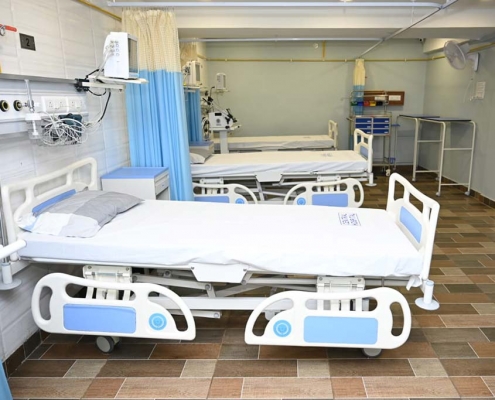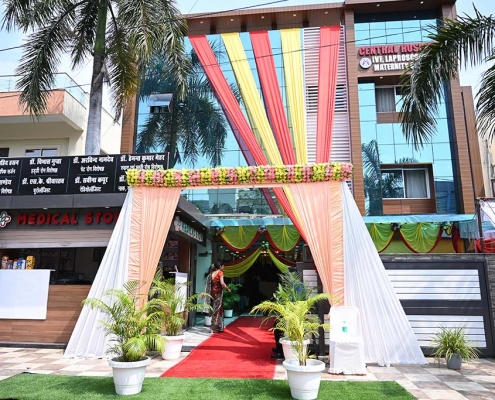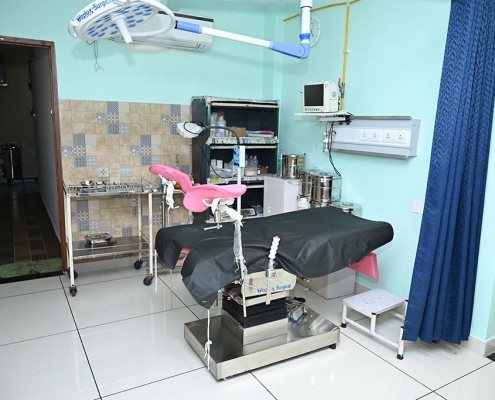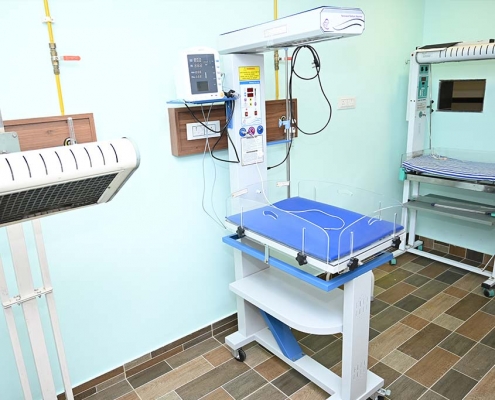Female Infertility Treatment in Bhopal – Causes and Symptoms
Understanding Female Infertility
Many couples struggle with infertility, and if you are unable to conceive, here are a few important things to understand about this condition. Female infertility treatment in Bhopal is becoming increasingly advanced, helping many women achieve successful pregnancies through personalized care and modern medical interventions.
Doctors define female infertility as the inability to conceive after trying for one year (or six months for women over 35). Doctors also consider pregnancy loss or recurrent miscarriages as forms of infertility. You should consult a fertility specialist for proper evaluation in such cases. If you have a history of irregular menstrual cycles, pelvic inflammatory disease, or endometriosis, it’s recommended to seek evaluation much earlier.
How Conception Happens
A healthy pregnancy in a woman involves several key steps, and any disruption in this process can lead to infertility. Here’s what needs to happen for successful conception:
-
The ovaries must release an egg (ovulation).
-
The egg must travel through the fallopian tube toward the uterus.
-
The male partner’s sperm must fertilize the egg.
-
The fertilized egg must attach itself to the uterine lining (implantation).
Failure in any of these steps may result in infertility, making female infertility treatment in Bhopal an essential option for many women facing challenges in conceiving.
When to get evaluated for infertility:
As mentioned above, getting pregnant or maintaining a healthy pregnancy is a complex process. The main symptom of infertility is the inability to get pregnant. However, several other symptoms may indicate underlying fertility issues, including:
-
Irregular or missed menstrual cycles
-
Severe menstrual cramps or pain
-
Hormonal imbalances, which may lead to acne, facial hair growth, or unexplained weight gain
-
Pain during intercourse
If you experience any of these symptoms, seeking female infertility treatment in Bhopal early can significantly improve your chances of conception. Fertility experts in Bhopal offer a range of diagnostic tests and treatment options tailored to your individual condition.
Advanced Fertility Support in Bhopal
With advanced medical facilities and experienced specialists, female infertility treatment in Bhopal is now more accessible and effective than ever before—helping hopeful couples realize their dreams of starting a family.
Age-Wise Fertility Evaluation Guidelines for Women
-
Below age 35 – It is generally recommended to try for pregnancy for at least one year before consulting a fertility specialist.
-
Ages 35 to 40 – If you’re unable to conceive after six months of regular, unprotected intercourse, it’s advised to seek medical evaluation.
-
Above 40 years – It’s best to get evaluated immediately and consider undergoing fertility tests and treatments, as age can significantly impact fertility.
Female Infertility Problems/Causes
Female Infertility Causes
If you have trouble conceiving, consult an infertility doctor to understand possible causes. In most cases, infertility is linked to ovulation problems. Irregular or absent menstrual cycles can signal poor ovulation. In such situations, opting for female infertility treatment in Bhopal can help.
There are a number of things that may be the reason for your infertility;
1. Ovulation disorders
One in four infertile couples suffers from ovulation disorder, where there is either infrequent ovulation or no ovulation at all. The underlying causes for ovulation disorders can be;
• Polycystic ovulation syndrome or PCOS – It is caused by hormone imbalance associated with insulin resistance and obesity, leading to acne and abnormal facial hair growth.
• Primary ovarian insufficiency – It is an autoimmune condition causing premature loss of eggs from ovaries. Genetics or chemotherapy can be the reason for this condition.
• Excess prolactin – Pituitary gland producing excess prolactin decreases the estrogen production causing infertility.
• Dysfunction of the hypothalamus – Excessive stress or weight gain can disrupt the hormone production of the pituitary gland. This affects ovulation and causes irregular menstruation.
2. Damage to fallopian tubes (tubal infertility)
Your fallopian tubes transport eggs from your ovaries to your uterus. Damage or blockage in these tubes can prevent the sperm from fertilizing the egg. Certain conditions cause damage or blockage of fallopian tubes, including:
• Pelvic inflammation, causing the infection of fallopian tubes in conditions like gonorrhea, chlamydia, or sexually transmitted diseases
• Previous surgery involving your abdomen or pelvis.
• Pelvic tuberculosis can also be the cause.
3. Endometriosis
When uterine tissue that generally seen lining inside the uterus grows outside, it is called endometriosis. Extra tissue or scarring from removing this tissue can block fallopian tubes. Endometriosis also affects the implantation of the fertilized egg leading to infertility.
4. Uterine or cervical causes
Uterine or cervical problems can affect your fertility by interfering with fertilized egg implantation. This results in loss of pregnancy or miscarriages.
• Polyps or benign tumors can cause blockage of fallopian tubes, or interfere with implantation affecting your fertility.
• Anatomical anomalies of the uterus can also be the reason for your infertility.
• Any damage to the cervix can cause cervical stenosis or narrowing of the cervix.
• The inability of the cervix to produce an adequate amount of mucus to allow the sperm to travel.
5. Unexplained infertility
Sometimes the underlying cause of infertility can not be determined. Several factors together in both couples can be the reason for infertility.
Female Infertility Diagnosis
Doctors evaluate infertility through physical examinations and review of medical and sexual history. Your fertility doctor may advise you to undergo several tests, including a blood test to evaluate your hormonal levels and endometrial biopsy to examine your uterine lining.
Hysterosalpingography (HSG)
This procedure helps to determine if there is any blockage in your fallopian tubes. During this procedure, the doctor injects a special dye or saline into your cervix and uses ultrasound or x-ray to locate blockages.
Laparoscopy
It is a minor surgery performed to get a better view of your reproductive organs. The surgeon inserts a small tool called a laparoscope into your lower abdomen through a small incision. The laparoscope carries a camera, allowing your doctor to check for abnormalities.
Determining the specific cause of infertility can be a long and emotional process. Seek help from your partner or family when needed. If you are having any anxiety or depression, discuss it with your doctor. Take all the required measures to help your doctor in finding the right cause and best possible treatment.
Female Infertility Treatment
Doctors commonly treat infertility with medication, artificial insemination, surgery, or assisted reproductive techniques. Doctors often prefer a combined approach to treat infertility. Depending on your test results, age, health, and history, your doctor will plan the line of treatment.
• Doctors perform laparoscopy to treat tubal or pelvic diseases or cysts.
• Doctors perform hysteroscopy to remove polyps, fibroid tumors, scar tissue, and to open blocked tubes.
• Doctors will prescribe drugs if you have ovulation issues.
Intrauterine insemination (IUI)
In this procedure, sperms are placed directly into your uterus during ovulation. Sometimes doctors give medication to stimulate egg release.
In vitro fertilization (IVF)
Doctors collect your eggs and place them in a petri dish. Doctors collect, wash sperm, and place them in the same petri dish for fertilization. Doctors then insert a healthy fertilized egg into your uterus. This procedure is called IVF.
ICSI (intracytoplasmic sperm injection)
In this procedure, doctors inject sperm directly into the egg for fertilization. Then the fertilized egg is placed into your uterus.
Depending on the underlying cause of infertility and your health, your doctor will plan the treatment procedures. It is essential to discuss with your doctor to understand the IVF treatment procedures.
Final Note
There are many causes that result in female infertility. A skilled doctor can help you with the right diagnosis and treatment. Recent advances in infertility treatments have benefitted many couples with a healthy pregnancy. If you are unable to conceive, getting evaluated for infertility and opting for infertility treatment is the best solution.
Latest Blog
Dr. Iram, Director of the Hospital
Lorem ipsum dolor sit amet, consectetur adipisicing elit, sed do eiusmod tempor incididunt ut labore et dolore magna aliqua.
The Visionary of Dr. Iram’s IVF Maternity & Laparoscopic Hospital
Dr. Iram, Director of the hospital
We offer the best support and service you can imagine. Use our support forum if you got any question and our team will respond, thats for sure! We got thousands of solved threads and a customer satisfaction of 97%. We do care that your site runs great!








